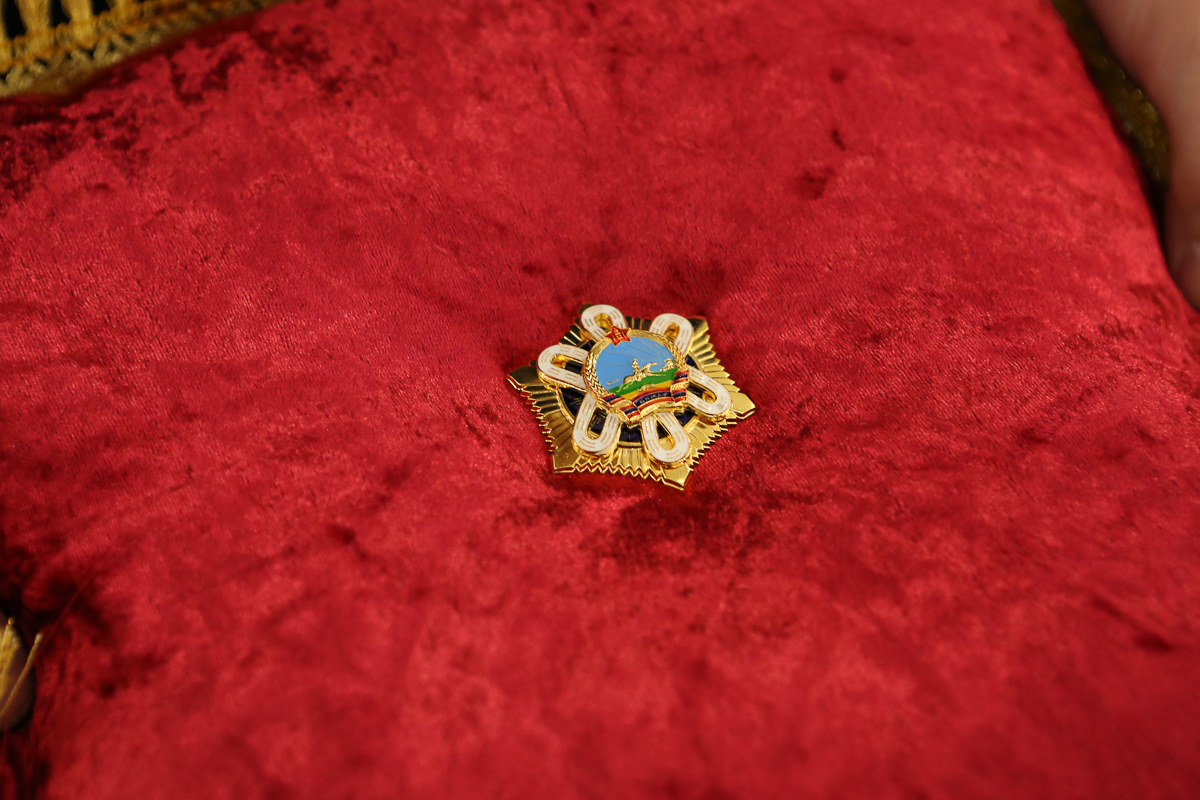St Petersburg University receives the highest award of Mongolia

The Order of the Polar Star has been awarded to St Petersburg University in the Petrovsky Hall. The grand ceremony was attended by Saldangiin Odontuya, Deputy Speaker of the State Great Khural of Mongolia.
Nikolay Kropachev, Rector of St Petersburg University, took part in the ceremony. He emphasised that, for almost 200 years, relations between the University and Mongolia have traditionally been of friendly partnership nature. Nikolay Kropachev noted the contribution of the Faculty of Asian and African Studies of St Petersburg University in awarding the University with an honorary award: ‘It is our orientalists who have always been at the forefront of cooperation with your country. I am pleased that the work of our colleagues is so highly appreciated in Mongolia. If we join forces together, both the Department of Mongolian and Tibetan Studies and research in this field will advance even further.’
‘This award is the highest recognition of our contribution to the development of the scientific school of Mongolian Studies at St Petersburg University. On behalf of the University's staff, I thank your country's leadership and all the graduates of St Petersburg University who work in Mongolia for this honour,’ said Nikolay Kropachev, Rector of St Petersburg University.
The Order of the Polar Star is Mongolia's highest honour, conferred on individuals and organisations that have succeeded in building the country's strength, economy and culture. On the occasion of the centenary of the establishment of diplomatic relations between Mongolia and the Russian Federation, Mongolian President Uhnaagiin Khürelsükh awarded the Order to St Petersburg University for its great contribution to training highly qualified specialists in the public, cultural, economic and political spheres.
In her welcoming speech, Saldangiin Odontuya, Deputy Speaker of the State Great Khural of Mongolia, congratulated the staff of the University on the award and noted that all the graduates of St Petersburg University from Mongolia are working for the benefit of their country: ‘We have several generations of graduates, and among them there are prominent politicians, public figures, scientists and professionals in various fields.’
Thus, the State Great Khural includes three graduates of St Petersburg University. Among them are: Deputy Speaker Saldangiin Odontuya herself; Munhuugiin Oyunchimeg, Chairman of the Khural Standing Committee on Social Policy; and Luvsantseren Enkh-Amgalan, Mongolia's Minister of Science and Education. In 2015, the Mongolian Alumni Association of St Petersburg University was established. Its members donated 160 books on Mongolian history, culture and life to the library of the University.
For students from our country, St Petersburg University is one of the widely recognised centres for teaching and learning the Mongolian language and Mongolian history.
Saldangiin Odontuya, Deputy Speaker of the State Great Khural of Mongolia
Earlier, Mongolia's awards were presented to those who had made a significant contribution to the development and strengthening of scientific and friendly relations with this country: Professor Mikhail Piotrovsky, Director of the State Hermitage Museum and Dean of the Faculty of Asian and African Studies at St Petersburg University; and Professor Vladimir Uspenskii, Head of the Department of Mongolian and Tibetan Studies at St Petersburg University. Also, Mariia Petrova, Associate Professor in the Department of Mongolian and Tibetan Studies received the Medal of Friendship.
The first Mongolian language department in Russia and Europe was established at the University in 1855, along with the Faculty of Asian and African Studies. In different years, outstanding scholars of Mongolian studies have worked there, such as: Konstantin Golstunsky, the creator of the first Mongolian-Russian dictionary; Aleksei Pozdneev, the author of a collection of Samples of folk literature of the Mongolian tribes; and Sergei Kozin, the translator of the oldest Mongolian literary monument ‘The Secret History of the Mongols’ to name just a few.
During the ceremony, Nikolay Kropachev, Rector of St Petersburg University made proposals for further cooperation with Mongolia. Among them are: the development of joint online courses on the culture, history and tourist opportunities of Mongolia in Russian, Mongolian, and English; the creation of a Mongolian Cabinet at St Petersburg University; the opening of a testing centre for Russian as a foreign language in one of the Mongolian universities; participation in the ‘Online School’ for high school students from Mongolia; and exchange of modern digital technologies.

